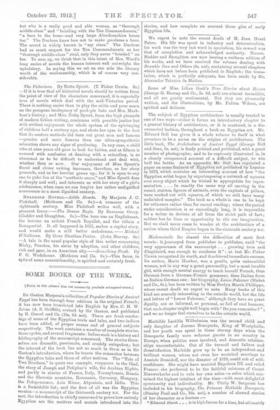Mathilde Laetitia, Wilhelmina was the second child and only daughter
of Jerome Bonaparte, Xing of Westphalia, and her youth was spent in those stormy days when the Bonaparte family were welcome guests in no country in Europe, when polities were involved, and domestic relation- ships uncomfortable. Out of the turmoil and failure and dissatisfaction Mathilde grew up to be an independent and brilliant woman, whom not even her wretched marriage to Anatole Demidoff, nor the disaster of 1870, could rob of self- confidence. She might have married Napoleon IIL and ruled France:. she preferred to be the faithful mistress of Count Nieuwerkerke and to rule her own salon—a salon which con- tained the highest intellect of the time—with most delightful spontaneity and individuality. Mr. Philip W. Sergeant has included in his biography, The Princess Mathilde Bonaparte (Stanley Paul and Co., 16s. not), a number of shrewd stories of her character as a hostess :— " Edmond About . . . is in high favour for a time, but ultimately Offends the Princess by a thoughtless remark. Invited to dinner, ho arrives early, and is talking to her when Nieuworkerke appears. I have jot your property,' says About, but don't be afraid, you jealous Man.' The Princess rises from her Chair, rings the bell, and orders M. About's Carriage to be called, as he is not Staying to dinner."
The book gains in interest from the fact that Mr. Sergeant's chief authority for the earlier years of the Princess's life is a man who was entirely hostile to the Bonapartes and especially to Mathilde: Viel-Castel's dislike and Mr. Sergeant's admira- tion being about evenly balanced, we are left free to form our own opinion of "the good Princess."







































 Previous page
Previous page